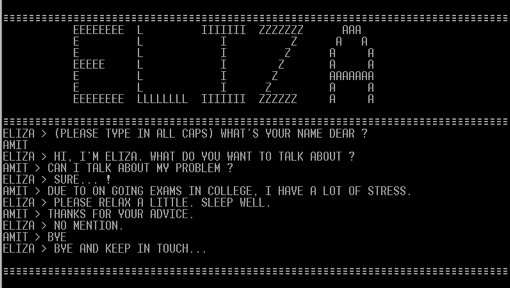The functions of Chatbots are expansive and ever-evolving. Specifically, in terms of commercial use, the integration of virtual assistance in businesses is an expedient and inexpensive, new media alternative to personal interaction, as it replaces the roles of operators and customer care representatives with an extensive online database, capable of simultaneously allocating attention to several customers.
On a personal level, however, the advantages of A.I. communication are less practical and profitable. Accordingly, my experiment with ELIZA, “the first program of Artificial Intelligence technology to apply the concept of stimulus-response pattern recognition to natural language understanding" sought to explore the benefits and challenges of this specific psychiatrist program, while recognizing its value as an enactment of “the procedural and participatory foundation of the computer [which] provide[s] the basis for what we think of as the defining experience of the digital medium, its ‘interactivity.’”
The primary purpose of my approach was to measure the effectiveness of this new media in relation to the old media of individual interaction. In doing so, I relied on ELIZA’s psychotherapy to assist me with personal issues, ranging from problems with my “overbearing mom” to my discontent with my “cheating boyfriend.” The criteria used in developing my assertions include evaluations on the extent of compassion demonstrated by the chatbot, the amount of guidance attained from our conversations, and the level of clarity within our communication.

No comments:
Post a Comment